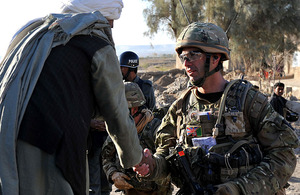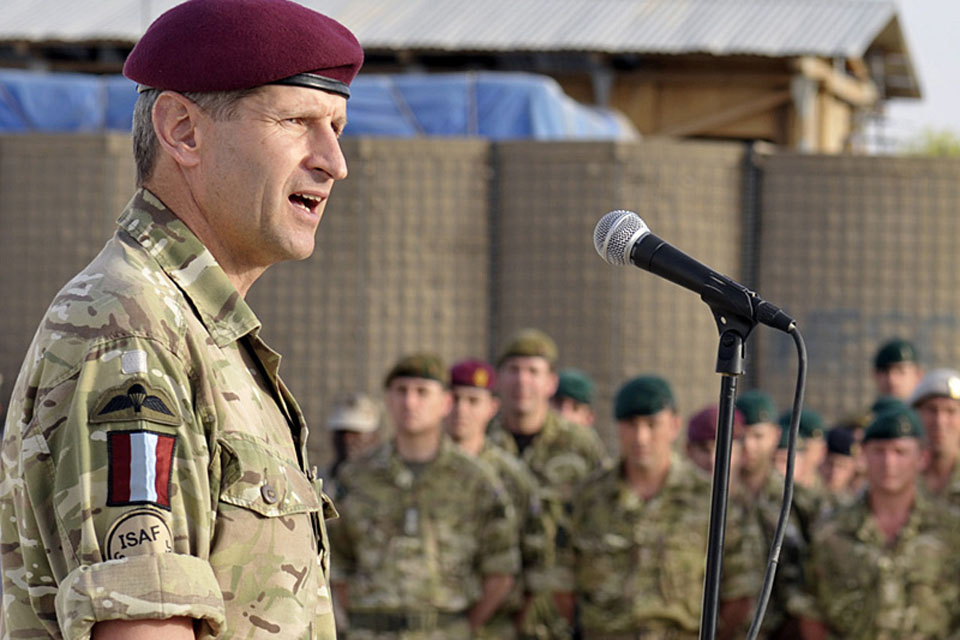16 Air Assault Brigade leaves insurgency 'fractured and demoralised'
Following the recent return of 16 Air Assault Brigade from their six-month tour of duty in Helmand province, Commanding Officer Brigadier James Chiswell has said the success of this campaign has left the insurgency increasingly fractured and demoralised, and, as a result, has less of a grip on the local community.

An Afghan elder greets a joint patrol of British soldiers and Afghan National Police in Lashkar Gah [Picture: Sergeant Rupert Frere, Crown Copyright/MOD 2010]
Speaking at a press briefing in London yesterday, Major General John Lorimer, the Chief of the Defence Staff’s Strategic Communications Officer, introduced the brigade’s commanding officer, Brigadier Chiswell, but started by reminding people that although it was understandable that events in North Africa were dominating the news, as far as the MOD and the Armed Forces were concerned, Afghanistan was still the main effort.
A lot of people are working very hard in MOD, PJHQ [Permanent Joint Headquarters] and elsewhere to support those 10,000 men and women in Afghanistan,” he said.
This was 16 Air Assault Brigade’s fourth deployment to Afghanistan; they were the first to enter Kabul, and this was followed by three tours in central Helmand, the last before this one being in 2008:
I can say that there has been a fundamental shift since we were last here,” said Brigadier Chiswell.
The most obvious thing we noticed was the fundamental shift in force densities. In 2008 we left with between 6,000 to 7,000 soldiers in the whole of Helmand, now there are 30,000 [20,000 US and 10,000 UK], and in that model the UK’s area has been significantly reduced.

Brigadier James Chiswell addresses British troops as 16 Air Assault Brigade hands over to 3 Commando Brigade in Lashkar Gah [Picture: Sergeant Russ Nolan, Crown Copyright/MOD 2011]
Now the UK’s patch has condensed down to three central districts, Nad ‘Ali, Lashkar Gah and Nahr-e Saraj:
The effect of this consolidation,” said Brigadier Chiswell, “is that it has enhanced the sense of stability and coherence in the way we are operating and the enduring nature of the operation. It is clear that that is we are where we are and we are not moving.
This stability has meant that the brigade has been able to build an even deeper understanding of their patch, and grow stronger, critical links with the local population.
Being fixed, living in around 120 locations across Helmand, and mostly partnered with the Afghan Police and Army has also been of benefit from the soldiers’ perspective:
Fixed is good from the point of view of counter-insurgency; there’s a proximal sense of security that comes from those locations. It has allowed us, with the new force density, to balance that with manoeuvre,” said the Brigadier.
Technical advances have helped too. The extraordinarily good camera systems on the fixed balloons (the American PJSS system) tethered around bases has allowed the battle group to open up their understanding of the operational area:
Lay on top of that,” said Brigadier Chiswell, “advances in biometric analysis, we are getting to the point where we are removing the anonymity of the insurgents within the area; we just understand too much about the patch we are operating in. This combination allows us to better conduct full-spectrum counter-insurgency.
Having an uncommitted operations company for each of the ground-holding battle groups allowed 16 Air Assault Brigade to generate a particularly high operational tempo of activity, bringing a great deal of pressure onto the opposition:
We were clearly the beneficiaries of a lot of good work that has been done before, and there is a strong sense that the insurgents are under pressure, and they are examining their options,” said Brigadier Chiswell.
It has been a difficult summer and winter for the insurgents, and, because of the increased force levels, they have been hit on a broad front, and 16 Air Assault Brigade were resident in places which until recently had been Taliban sanctuaries.
There has been a deliberate campaign to identify and relentlessly target the insurgent middle-order leaders and key facilitators, for example those with bomb-making expertise.
The success of this campaign has meant that the insurgency is increasingly fractured and demoralised and as the key leaders are removed they are being replaced by much younger individuals with less experience and hence less of a grip on the local community:
That having been said, the insurgents have proved themselves over the years to be resilient and adaptable, so we will have to see how it regroups for the coming summer,” said Brigadier Chiswell. “A move to more asymmetric warfare, suicide bombing and intimidation is what I would expect.
Brigadier Chiswell said that he felt that with the insurgents being under such pressure, he had seen a commensurate rise in the level of confidence and trust in the local communities:
What struck me on arriving was the level of the local dislike of the Taliban,” he said.
I had thought that this would be more a contest of narratives in terms of what the Taliban could offer versus what the Government was offering,” said Brigadier Chiswell. “I found that it was in fact more a contest of local confidence that the Taliban offers were hollow, underpinned by fear. The challenge for us is to give the people the confidence to stand up and reject that intimidation and to put their trust in the state.
The Brigadier felt that four strands had contributed to a sense of local optimism:
-
first, that the insurgents were looking vulnerable and that as their leadership had been hit hard so those coming in to replace them were getting younger and less experienced with less prestige, so less able to spread a blanket of fear across the province;
-
secondly, the maturing of provincial and district level governance led by men of courage such as Governor Mangal had led to confidence among the people that the Government was working;
-
the third strand was the increasing professionalism of the Afghan security forces in which the locals were clearly taking pride and were beginning to trust both the army and the police force as agencies that would keep them safe; and
-
fourthly, that stabilisation projects such as road construction, and the building of schools and police stations were beginning to deliver.
The net effect from the local perspective is that they can see something that shapes up in terms of a weakened enemy, a functioning governance underpinned by decent security which is presenting opportunities for development,” said the Brigadier.
The question as we come back on the cusp of summer is, is this a seasonal factor or is it more profound and enduring. That will only be answered come the summer, but when I talk to Afghans, such as Sherin Shah who commands the Afghan 3rd Brigade with which I was partnered, his view was that it was a bit of both, but that this winter has felt fundamentally different to the last nine he has spent fighting in these valleys, and what he would put his finger on is this point about local optimism.
General Lorimer concluded the briefing by saying:
What 16 Brigade has done in the last six months, based on the achievements of preceding brigades, has been significant.
It has been a tremendous tour,” he added.